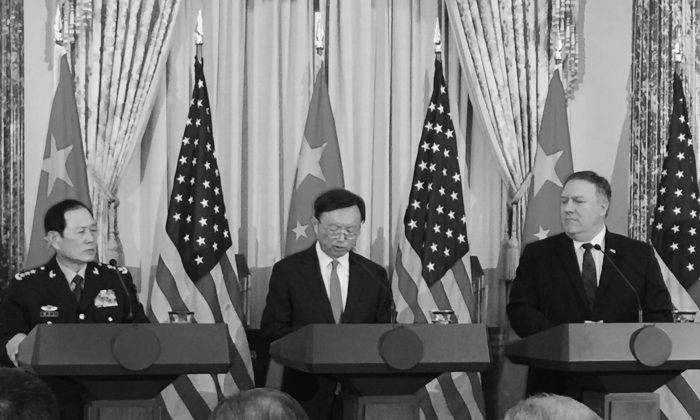Treating the Press as Props for a Puppet Show About U.S.-China Relations
November 12, 2018 Updated: November 12, 2018
WASHINGTON—Hundreds of journalists pressed forward to get into the Department of State to cover the U.S.-China Diplomatic and Security Dialogue. After some hustle, we were squeezed into a big hall.
The four main “characters” of the conference—Secretary of State Michael Pompeo, Secretary of Defense James Mattis, Director of the Office of Foreign Affairs of the Central Commission of the Communist Party of China Yang Jiechi, and State Councilor and Defense Minister General Wei Fenghe—each gave remarks.
Altogether they talked for about 20 minutes. Very few new points were made, and each person seemed to be repeating himself. However, on major issues such as the South China Sea, Taiwan, and human rights, there still existed fundamental differences between the two sides.
Foreign Minister Yang talked for longest, with a speech lasting 10 minutes and 32 seconds (as a TV reporter for many year, I am used to counting time by second.) It was very empty and therefore very boring.
Questions and Answers
Then it was finally Q & A time. With the fresh memory of the long, intense press conference President Trump had given two days ago, I thought this part would be very interesting.
But there was to be no free give and take with the press. A staff member announced that they would only answer questions from 4 reporters. Then he immediately asked the reporter from Voice of America to ask a question.
Reporters at the U.S.-China Diplomatic Security Dialogue in Washington on Nov. 9, 2018. (Jennifer Zeng/The Epoch Times)
After that a Chinese speaking host (I assume he was from the Chinese delegation?) asked a reporter from the state-run Xinhua news agency to ask her question.
Her question was directed to General Wei, and went like this, “Please brief us on China’s defense policy and the military-to-military relationship between China and the U.S.”
I couldn’t help thinking to myself, “Can this be called a ‘question’?”
And then, to my great surprise, General Wei actually read off his “reply” from a pre-written script when he “answered” this question, just as he had done when he gave his speech!
I remember seeing a young Chinese man in uniform putting some paper onto Wei’s podium before the conference started. So his “reply” must have been already on the paper then.
Wei’s “reply” lasted for 3 minutes and 49 seconds. Apart from old communist cliches that have been repeated a thousand times, there was nothing there.
The third “chosen” reporter was someone from the Wall Street Journal. She used 33 seconds to phrase her question about the planned U.S. withdrawal from the Intermediate-Range Nuclear Forces Treaty, and got a four second answer from Pompeo: “We did not spend time talking in detail about that issue today.”
Then it was again the turn for a Chinese reporter to ask a question. This time the chance was given to the state-run China Central TV.
The “question” was, “Director Yang, can you elaborate on China’s efforts for world peace and development, and in your view, how the current China-U.S. economic and trade issues should be addressed? And can you comment on the prospect of China-U.S. relations?”
With such a good chance and huge audience (nobody knows how many were watching the live stream of the conference), “Director Yang” spared no efforts to “elaborate on China’s efforts for world peace and development,” reading from a prepared script. His “reply” lasted for 5 minutes and 2 seconds.
Then this 39 minute press conference was over. The U. S. side took 8 minutes and 45 seconds to speak and answer questions, while the Chinese side used up 25 minutes and 53 seconds, almost three times more than the U. S. side.
Secretary of State Michael Pompeo addresses the press at the U.S.-China Diplomatic Security Dialogue in Washington on Nov. 9, 2018. (Jennifer Zeng/The Epoch Times)
Reciprocity
Pompeo said at the beginning of his speech, “As President Trump has made clear, the United States seeks a constructive, results-oriented relationship with China grounded in fairness, reciprocity, and respect.”
As far as this press conference is concerned, “fairness, reciprocity, and respect” were far from being achieved.
Why did the Chinese side talk so much longer than the U.S. side? If the questions and “answers” were pre-planned and pre-written, why didn’t they just release a recorded video? If they didn’t plan to give other reporters, especially American reporters, the chance to ask questions, why did they call a press conference, and waste the valuable time of so many reporters?
This was disrespect, an insult to the “Fourth Estate.” Journalists are supposed to ask questions on behalf of the public, not waste their time listening to communists preach. Why should the Department of State agree to such an arrangement?
The Script
An experience I had as a reporter in Sydney for New Tang Dynasty Television may shed some light on the goings on at Foggy Bottom.
One day I was going to cover a street fair with a newly recruited cameraman who had just come from China and once worked for a provincial TV station. Before we went out, he asked, “Where is the script?”
I didn’t understand his question and asked, “What script?”
He was in turn surprised at my surprise. It took me quite some time to find out what he meant by “the script.” In China, each time before he went out to shoot an event, he was given a complete, pre-written news script, including all the voice-over parts and who was going to say what. So when someone on his script started reading off his or her speech, he needed only to record the few sentences which were on the “script.”
I also found that although this cameraman was very good at shooting the so-called “B roll” with the camera very steadily placed on his shoulder, he didn’t know how to set up the camera on a tripod or connect the audio wire for interviews.
Then I realized that he would have had no experience doing these things. In China, ordinary citizens are usually not to be interviewed. Party leaders all read from their scripts. So there was no need for him to set up his camera for just a “randomly caught” interviewee, as that had never happened in his entire career.
There are other differences between reporting in the West and in China. It is relatively much easier to grab a Westerner on the street for an interview. Most of them are ready to talk, very composed in front of the camera, and can express themselves quite well.
However, it is very, very difficult to get Chinese people, especially people from mainland China to talk in front of a camera, even about the issues they care about very much, such as a subway fare hike, immigration, or education issues. Sometimes even if they do agree to speak, they cannot express themselves clearly or speak right to the point.
And I understand why. In China, ordinary people, as well as Communist Party members, are not allowed to speak publicly about their thoughts. They are fearful; they are not used to talk in front of a camera. It is too dangerous. So even after they migrate to Western countries, they still prefer not to talk publicly.
In other words, everything in China is pre-arranged. All the “news” events and “news” reports should actually be called pre-arranged puppet shows. The party is the script writer and director for everything. Everyone has to “play” strictly according to the script. No surprises are allowed.
Watching the two Chinese officials standing and speaking together with their U. S. counterparts in the Department of State, I felt that Yang and Wei looked like two puppets being controlled by a long, invisible thread from Beijing. They didn’t look like a living individual with their own thoughts and free will. Just puppets.
This made me again think about President Trump’s press conference. No matter how intense or fierce it was, at least nobody was reading from a script; and we could see so many things being revealed truthfully.
But if U. S. reporters were allowed to give such a hard time to our own president, why weren’t they allowed to give a little bit of a hard time to the Chinese officials who chose to hold a press conference in the United States?
While their long, long preaching could nearly bore the on-site U. S. reporters to death, they would be surely used as very good propaganda material for people in China, to show them how well those two officials were doing in Washington, how tough their stance was, how their “dear party” still is “great,” and how the U. S. officials and reporters had no choice but to listen.
That’s also why they had to speak for so long. They were speaking to their audience in China.
It is sad that when the U. S. does things with China, it is “business as usual.” Instead of having them learn from us, we always give in to their ways of doing things, even in the Department of State, where a joint press conference turned into a puppet show.
Director of the Office of Foreign Affairs Yang Jiechi (C) reads from a script in answer to a question at the U.S.-China Diplomatic Security Dialogue in Washington on Nov. 9, 2018. (Jennifer Zeng/The Epoch Times)








